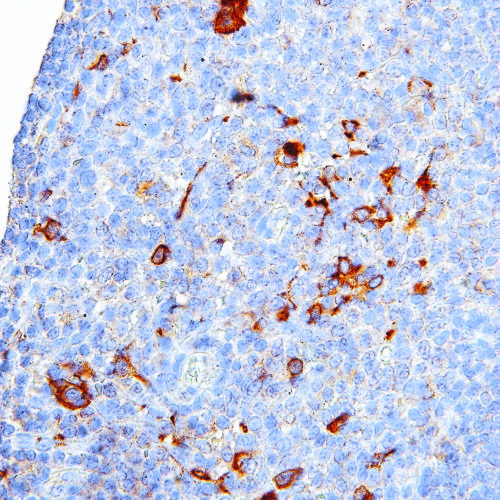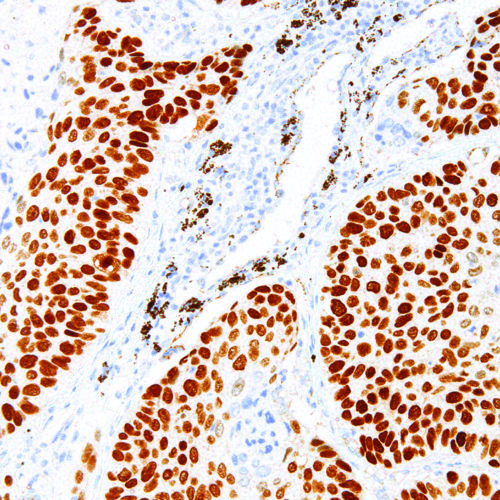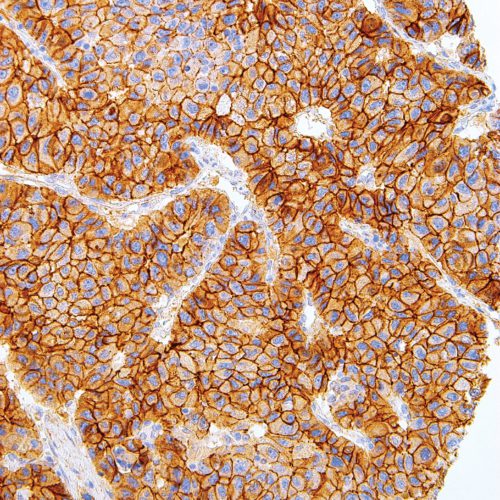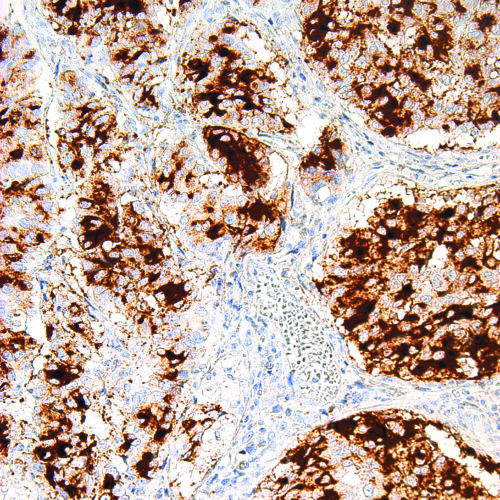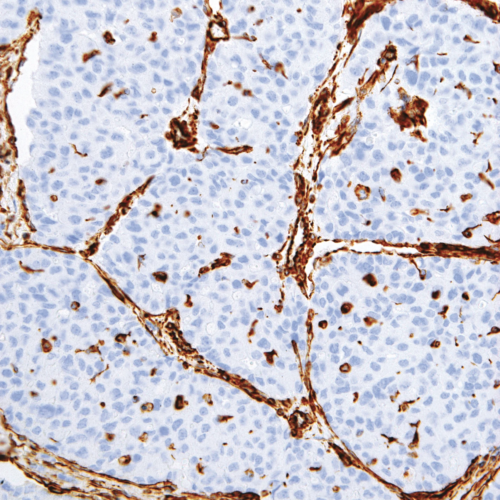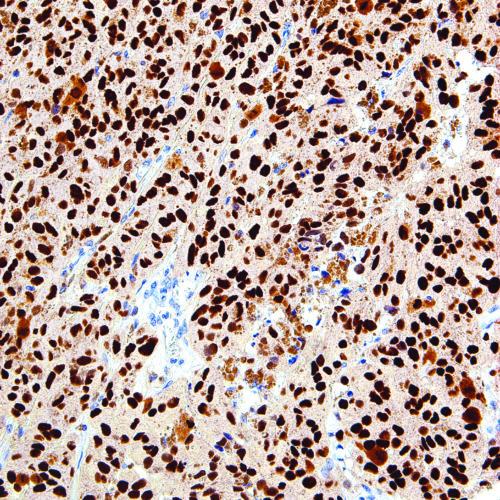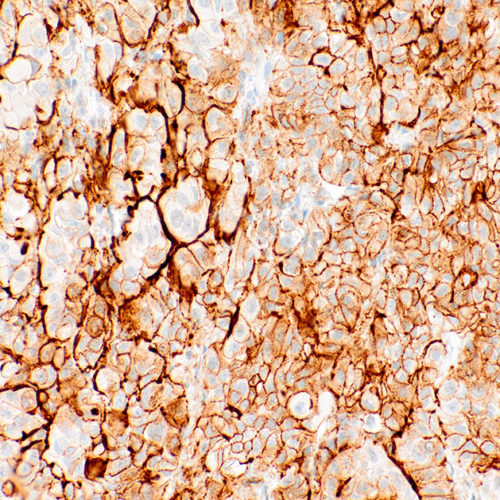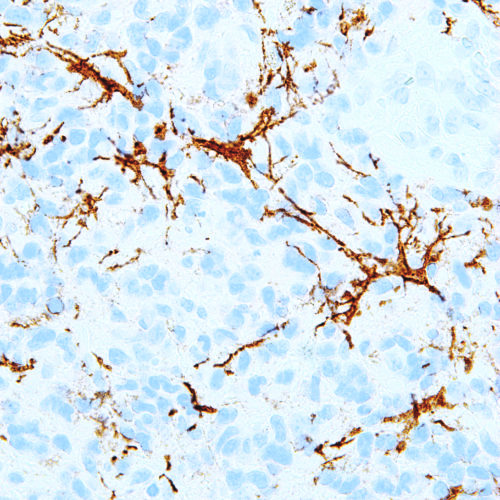High quality products to support Pathologists and Biological and Environmental Scientists
GeneAb™ CTLA-4
$120.00 – $920.00Cytotoxic T-Lymphocyte-Associated Protein 4 (CTLA-4) is a receptor on T helper cells that functions as an immune checkpoint and downregulator of immune responses. Mutations in CTLA-4 are associated with insulin-dependent diabetes mellitus, Hashimoto’s thyroiditis, Graves’ disease, systemic lupus erythematosus (SLE), celiac disease, primary biliary cirrhosis, thyroid-associated orbitopathy, multiple sclerosis, and other autoimmune diseases. The spliced variant of CTLA-4 in SLE is present in the patient’s serum. Haploinsufficiency of CTLA-4 causes the immune system disorder known as CTLA-4 deficiency or CHAI disease (CTLA-4 haploinsufficiency with autoimmune infiltration).
GeneAb™ p40
$130.00 – $535.00Anti-p40 recognizes squamous and basal cells, the shortest variant of p53, and ΔNp63 (an isoform of p63). p40 has been indicated as an alternative to p63 for the detection of Squamous Cell Carcinoma (SqCC), offering the advantage of eliminating potential misinterpretation of a positive adenocarcinoma as a SqCC.
GeneAb™ N-cadherin
$210.00 – $980.00N-cadherin, also known as Cadherin-2 (CDH2) or Neural Cadherin (NCAD), is a transmembrane cell adhesion molecule that was originally detected in nervous tissue. It plays an important role in embryogenesis, being involved in gastrulation and neural crest development. N-cadherin is found is cancer cells and allows for transendothelial migration, which is a critical process in the metastasis of cancer. Overexpression and disorderly arrangement of N-cadherin has been noted in dilated cardiomyopathy. It has been suggested that, when considered in adjunct with the status of a number of additional cell-cell adhesion molecules, missense mutations in N-cadherin may be a potential indicator of obsessive-compulsive disorder and Tourette disorder.
GeneAb™ BG8, LewisY
$115.00 – $390.00BG8 LewisY, also known as LewisY blood antigen or simply BG8, is a blood group antigen that has been identified in many studies as a potential marker for differentiation between pulmonary adenocarcinoma (PACA) and epithelioid mesothelioma (EM). It has been reported that sensitivity of non-mesothelial antigens for adenocarcinoma is organ-dependent. When attempting to differentiate epithelioid mesothelioma from adenocarcinoma, BG8 LewisY performed at a sensitivity of 98% in the breast cancer group, and 100% in the lung cancer group.
GeneAb™ Vimentin
$60.00 – $290.00Vimentin is a component of intermediate filament in mesenchymal cells, such as endothelial cells, fibroblasts, lymphocytes, and melanocytes. Anti-Vimentin is useful for assessing whether tissue samples have been processed and preserved properly. A panel of Anti-Vimentin and Anti-Keratin is useful for differentiating melanomas from large cell lymphomas and undifferentiated carcinomas. This diagnostic grade Vimentin IVD antibody stains melanomas and schwannomas, as well as Endometrial endometrioid adenocarcinomas.
GeneAb™ SOX10
$100.00 – $415.00SRY (Sex Determining Region Y)-Box 10 (SOX-10), also known as transcription factor SOX-10, is a nuclear transcription factor that acts in regulation of embryonic development and in the specification and differentiation of cells of melanocytic lineage. SOX-10 is diffusely expressed in neurofibromas and schwannomas, and mutations in the SOX-10 gene are linked to Waardenburg-Shah and Waardenburg-Hirschsprung disease. Anti-SOX-10 has been shown to be sensitive for conventional, spindled, and desmoplastic melanoma, and has been used to detect metastatic melanoma and nodal capsular nevus in sentinel lymph nodes.
GeneAb™ Podoplanin
$85.00 – $490.00Podoplanin is a transmembrane mucoprotein specifically expressed in the endothelium of lymphatic capillaries, while remaining absent from the blood vasculature. The protein is co-localized with VEGFR3/FLT4 in normal skin and kidney. Anti-Podoplanin is useful in the identification of lymphangiomas, Kaposi’s sarcomas, epithelioid mesotheliomas, hemangioblastomas, seminomas, and some angiosarcomas which likely have lymphatic differentiation.
GeneAb™ Nerve Growth Factor Receptor (NGFR)
$115.00 – $520.00Nerve Growth Factor Receptor (NGFR), also known as p75, P-75NTR or CD271, is a neurotrophin receptor belonging to the tumor necrosis factor receptor family. NGFR is expressed mainly in Schwann cells and neurons, as well as a number of other non-neuronal cell types, and functions during central and peripheral nervous system development to regulate neuronal growth, migration, differentiation, and cell death. Nerve Growth Factor Receptor is also expressed in melanocytes, melanomas, neuroblastomas, pheochromocytomas, neurofibromas, neurotized nevi (type C melanocytes), and other neural crest cell or tumor derivatives. It has been suggested that NGFR may act as a tumor suppressor indicated in prostate and urothelial cancer, and Anti-Nerve Growth Factor Receptor (NGFR) is often used in adjunct with S100, to aid in the diagnosis of desmoplastic and neurotrophic malignant melanomas. Anti-NGFR is also useful as an aid in the diagnosis of breast malignancy, as the antibody labels the myoepithelial cells of breast ducts and intralobular fibroblasts of breast ducts.
